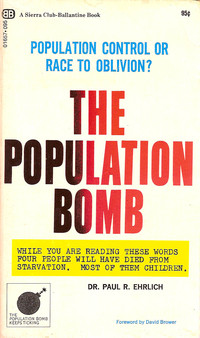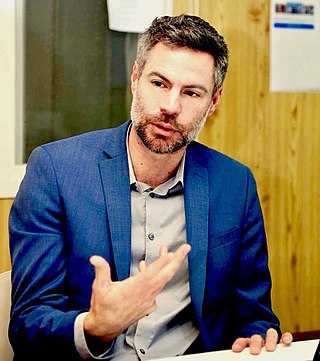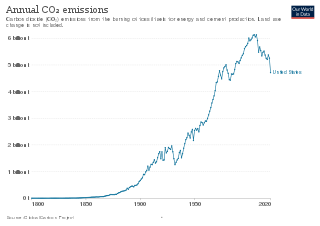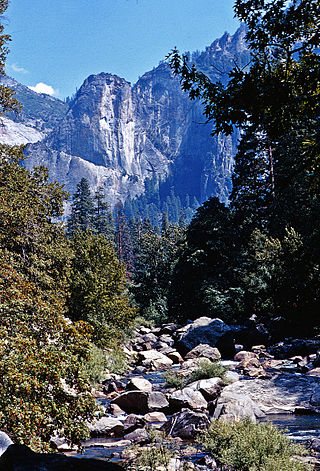Related Research Articles

The Population Bomb is a 1968 book co-authored by Stanford University Professor emeritus Paul R. Ehrlich and Stanford senior researcher emeritus in conservation biology Anne Howland Ehrlich. It predicted worldwide famine due to overpopulation, as well as other major societal upheavals, and advocated immediate action to limit population growth. Fears of a "population explosion" existed in the mid-20th century baby boom years, but the book and its authors brought the idea to an even wider audience.

Consumerism is a social and economic order that encourages the acquisition of goods and services in ever-increasing amounts. With the Industrial Revolution, but particularly in the 20th century, mass production led to overproduction—the supply of goods would grow beyond consumer demand, and so manufacturers turned to planned obsolescence and advertising to manipulate consumer spending. In 1899, a book on consumerism published by Thorstein Veblen, called The Theory of the Leisure Class, examined the widespread values and economic institutions emerging along with the widespread "leisure time" at the beginning of the 20th century. In it, Veblen "views the activities and spending habits of this leisure class in terms of conspicuous and vicarious consumption and waste. Both relate to the display of status and not to functionality or usefulness."

The Sierra Club is an environmental organization with chapters in all 50 United States, Washington D.C., and Puerto Rico. The club was founded on May 28, 1892, in San Francisco, California, by Scottish-American preservationist John Muir, who became the first president as well as the longest-serving president, at approximately 20 years in this leadership position. The Sierra Club operates only in the United States and holds the legal status of 501(c)(4) nonprofit social welfare organization. Sierra Club Canada is a separate entity.
Joe Conason is an American journalist, author and liberal political commentator. He is the founder and editor-in-chief of The National Memo, a daily political newsletter and website that features breaking news and commentary. Since 2006, he has served as editor of The Investigative Fund, a nonprofit journalism center.
The wise use movement in the United States is a loose-knit coalition of groups promoting the expansion of private property rights and reduction of government regulation of publicly held property. This includes advocacy of expanded use by commercial and public interests, seeking increased access to public lands, and often opposition to government intervention. Wise use proponents describe human use of the environment as "stewardship of the land, the water and the air" for the benefit of human beings. The wise use movement arose from opposition to the mainstream environmental movement, claiming it to be radical.
Spiritual ecology is an emerging field in religion, conservation, and academia recognizing that there is a spiritual facet to all issues related to conservation, environmentalism, and earth stewardship. Proponents of Spiritual Ecology assert a need for contemporary conservation work to include spiritual elements and for contemporary religion and spirituality to include awareness of and engagement in ecological issues.
David Helvarg is an American journalist and environmental activist. He is the founder and president of the marine conservation lobbying organization Blue Frontier Campaign, a part of the Seaweed rebellion, which arose from his second book Blue Frontier. His first book, The War against the Greens, puts a case that violent organized resistance is being orchestrated against the environmental movement.
Anne Howland Ehrlich is an American senior research scientist emeritus in conservation biology in the Department of Biology at Stanford University and co-author of more than thirty books on overpopulation and ecology with her colleague and husband, Stanford professor Paul R. Ehrlich, including The population Bomb (1968), The Stork and the Plow (1995), with Gretchen Daily, and The Dominant Animal: Human Evolution and the Environment (2008). She also has written extensively on issues of public concern such as population control, environmental protection, and environmental consequences of nuclear war.

Techno-progressivism or tech-progressivism is a stance of active support for the convergence of technological change and social change. Techno-progressives argue that technological developments can be profoundly empowering and emancipatory when they are regulated by legitimate democratic and accountable authorities to ensure that their costs, risks and benefits are all fairly shared by the actual stakeholders to those developments. One of the first mentions of techno-progressivism appeared within extropian jargon in 1999 as the removal of "all political, cultural, biological, and psychological limits to self-actualization and self-realization".

Environmentalism or environmental rights is a broad philosophy, ideology, and social movement regarding concerns for environmental protection and improvement of the health of the environment, particularly as the measure for this health seeks to incorporate the impact of changes to the environment on humans, animals, plants and non-living matter. While environmentalism focuses more on the environmental and nature-related aspects of green ideology and politics, ecologism combines the ideology of social ecology and environmentalism. Ecologism is more commonly used in continental European languages, while environmentalism is more commonly used in English but the words have slightly different connotations.
This bibliography of George W. Bush is a list of published works, both books and films, about George W. Bush, the 43rd president of the United States.
Council of Republicans for Environmental Advocacy (CREA) was a Republican environmental organization founded in 1998 by Gale Norton, who in 2001 became George W. Bush's U.S. Secretary of the Interior. CREA "evolved from a group" Italia Federici and Norton founded in 1997 "with tax activist Grover Norquist to push for Republican environmental goals." The organization's steering committee included lobbyists for the petroleum, mining, and auto manufacturing industries. The organization's president, Italia Federici, pleaded guilty in 2007 to obstructing the U.S. Senate investigation into the Jack Abramoff Indian lobbying scandal and for siphoning CREA funds for personal use. Abramoff donated more than $400,000 to her charity, after which time she began using her connections with J. Steven Griles, to influence him to make decisions beneficial to Abramoff's tribal benefactors. Later in 2007, CREA's vice president, Jared Carpenter, pleaded guilty of tax evasion for also diverting CREA funds for personal use.
Carl Pope is the former executive director of the Sierra Club, an American environmental organization founded by conservationist John Muir in 1892. Pope was appointed to his position as executive director in 1992, and served until January 20, 2010, when he was succeeded by Michael Brune. Pope then served as chairman of the Sierra Club until stepping down from that position in November 2011. He has served as the senior climate advisor to former New York City Mayor and 2020 Presidential candidate Michael Bloomberg since 2017.

Christian views on environmentalism vary among different Christians and Christian denominations.

Michael D. Shellenberger is an American author and former public relations professional whose writing has focused on the intersection of politics, the environment, climate change and nuclear power, as well as more recently on how he believes progressivism is linked to homelessness, drug addiction and mental illness. He is a co-founder of the Breakthrough Institute and co-founder of the California Peace Coalition. He is also the founder of Environmental Progress.

David W. Orr is the Paul Sears Distinguished Professor of Environmental Studies and Politics Emeritus at Oberlin College, and presently Professor of Practice at Arizona State University.

The environmental policy of the United States is a federal governmental action to regulate activities that have an environmental impact in the United States. The goal of environmental policy is to protect the environment for future generations while interfering as little as possible with the efficiency of commerce or the liberty of the people and to limit inequity in who is burdened with environmental costs. As his first official act bringing in the 1970s, President Richard Nixon signed the U.S. National Environmental Policy Act (NEPA) into law on New Years Day, 1970. Also in the same year, America began celebrating Earth Day, which has been called "the big bang of U.S. environmental politics, launching the country on a sweeping social learning curve about ecological management never before experienced or attempted in any other nation." NEPA established a comprehensive US national environmental policy and created the requirement to prepare an environmental impact statement for “major federal actions significantly affecting the quality of the environment.” Author and consultant Charles H. Eccleston has called NEPA, the world's “environmental Magna Carta”.

Conservation in the United States can be traced back to the 19th century with the formation of the first National Park. Conservation generally refers to the act of consciously and efficiently using land and/or its natural resources. This can be in the form of setting aside tracts of land for protection from hunting or urban development, or it can take the form of using less resources such as metal, water, or coal. Usually, this process of conservation occurs through or after legislation on local or national levels is passed.
Michael Brune became the youngest executive director of the Sierra Club at 38, an American environmental organization founded by preservationist John Muir, UC professor of botany Willis Linn Jepson, and attorney Warren Olney in 1892. He was hired by the 15 member board of directors to his position in January 2010, after Carl Pope was fired.
Laudato si' is the second encyclical of Pope Francis. The encyclical has the subtitle "on care for our common home". In it, the pope critiques consumerism and irresponsible development, laments environmental degradation and global warming, and calls all people of the world to take "swift and unified global action."
References
- ↑ Pope, Carl; Rauber, Paul (2006-05-04). Strategic Ignorance: Why the Bush Administration Is Recklessly Destroying a Century of Environmental Progress. Sierra Club Books. ISBN 1-57805-125-8.
- ↑ Pope, Carl; Rauber, Paul (2004-02-19). "Saving the Environment". The Nation . Retrieved 2008-08-19.